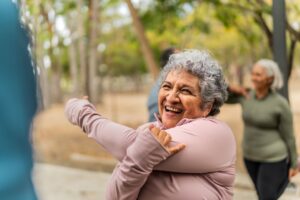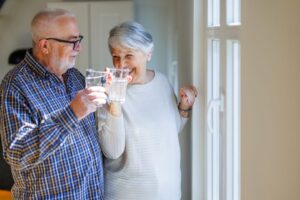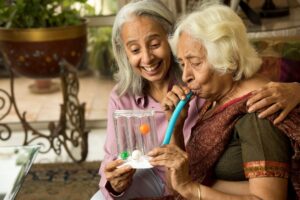As our population continues to age, it is important to know about all the available options for elderly care. In particular, the elderly care options in Brooklyn are among the best in the nation, and in this blog post, we will go over some of the alternatives to nursing homes that are available.
Whether you’re looking for ways to keep your loved ones close or if you’re merely curious about the latest in innovative alternatives, you will find something to help in this blog post.
Elderly Care Options Outside of Nursing Homes in Brooklyn
The elderly population in Brooklyn is growing, and the need for quality care outside of traditional nursing homes is becoming increasingly important. There are a variety of older adult care options available that allow seniors to remain independent and enjoy their later years without leaving their homes.
Home healthcare services, including medical support and assistance with daily living, are often provided by personal aides or visiting nurses. These services can help maintain an Elderly person’s safety, health, and comfort while allowing them to keep their independence.
Additionally, many areas have Adult Day Care Centers which provide social activities and companionship on a regular basis. This type of Day Care provides a great opportunity for Elders to make connections and socialize with peers who can help combat feelings of isolation and depression that come with aging.
Although some may argue that Baltimore’s older adult population needs more access to traditional nursing homes as well as other alternatives such as home healthcare, it is important to remember that these non-traditional models of care offer higher levels of personalization which results in better outcomes and happier residents. When done correctly, this type of care has been shown to be just as effective as nursing home care while reducing costs comparatively.
Ultimately, there are multiple options available for Elderly care in Brooklyn beyond nursing homes. Regardless of what route is taken by families or individuals, it is always important to look into all opportunities before making a decision. As we transition into the next section about family-based care for Loved Ones, it is important to note the importance of individualized attention for each senior’s unique needs within any given environment.
Family-Based Care for Loved Ones
When elderly individuals wish to receive care in their own homes or one close by, family-based care can be an excellent option. This type of service allows people the choice to keep their autonomy while still receiving support from a loving family member or other people they already know and trust.
Such an arrangement is mutually beneficial as it provides elderly individuals with a feeling of safety and security while still allowing them to stay at home; it also enables caregivers to give back to their community and helps families peak for one another through times of need.
There are, however, some potential drawbacks associated with this kind of care. If a senior is not living close enough to relatives or there is no family willing or able to provide assistance, this could be a challenging solution to find. Additionally, offering long-term support for an aging relative can be physically and emotionally draining for a primary caregiver, so access to additional support services may be needed. Finally, these arrangements may require difficult conversations between family members on how best to manage the care provided as well as covering financial considerations such as costs associated with medical bills and equipment.
In spite of these challenges, family-based care has several advantages that make it an important part of the available options which Brooklyn’s elderly can consider when seeking out care outside of nursing home facilities. Families tend to love and protect their members more than nurses do; hence, a more personal touch can be provided that helps maintain an overall sense of comfort and confidence among seniors receiving care in such arrangements.
In addition, because these services are less structured and routinely overseen by multiple providers–including both professional staff and direct relatives and friends–the quality of life can often be improved significantly compared to certain nursing home situations which may lack continuity of care from a single provider.
Ultimately, whether opting for family-based care is beneficial in any given situation will depend largely on the needs of the elderly individual in question as well as the resources available from those closest who are willing or able to help out. With thoughtfulness and due consideration for all involved parties, this type of service may offer an ideal solution for providing important assistance with daily activities while preserving autonomy for those receiving care.
For those transitioning into the next phase of life, accessing proper health conditions that come later on, and learning how best to manage such issues early on can help ensure better outcomes in later years.
Assisting With Health Conditions
When an elderly loved one is more likely to require constant medical care and assistance because of a chronic health condition, families face tough decisions when it comes to providing the best care. This can mean turning to nursing homes to seek a healthcare team that specifically specializes in the condition their family member is dealing with. However, not all families opt for this option as there are other ways of assisting with health conditions.
There is great debate among families on whether they should seek out private nurses or health aides who specialize in at-home care for seniors. On one hand, having a qualified nurse available at all times to provide medical attention means that families can reap the benefits of peace of mind knowing their loved one is in capable hands.
Furthermore, private nurses also offer regular reports on how their patient is doing physically, mentally, and emotionally. On the other hand, some families feel uncomfortable having a complete stranger come into their home to stay and potentially live with them long-term. Additionally, these services can be very expensive for some.
Ultimately, families must weigh the pros and cons of both nursing homes and at-home care for loved ones who have health complications and decide what makes the most sense based on their situation. Alternatively, there are other quality residential care homes throughout Brooklyn that offer professional medical attention outside of the home while still providing a homey environment with warm caregivers. It is important to ensure no matter what route you decide to take that your senior receives personalized care tailored to their needs so they can remain healthy, safe, and happy.
- According to a 2017 report from the New York City Department for the Aging, there were approximately 375,000 adults aged 65 and above living in Brooklyn.
- The same report found that about 16% of all older adults living in Brooklyn receive home care services such as homemaker services, personal care, or home health aide services.
- A 2018 survey from the New York City Department for the Aging found that 64% of people aged 65 and over in Brooklyn stated that they would prefer to stay at home for their long-term elder care needs.
Quality Residential Care Homes in Brooklyn
Residential care homes are also a popular option for elderly care in Brooklyn and offer several advantages over nursing homes. Residential care providers hire staff with specialized training, allowing them to provide services that can directly assist with health conditions such as physical therapy, medication administration, and others. Moreover, residential care facilities often provide a more home-like environment than nursing homes, which may support the emotional well-being of residents.
On the other hand, quality residential care homes can be more expensive than nursing homes due to their higher staffing levels and smaller populations. Furthermore, specializing in providing assistance for health conditions requires more advanced training for staff members which carries more overhead costs for providers. Additionally, depending on local regulations, there may be fewer resources available through residential care in comparison with nursing home environments.
Thus, when selecting an elderly care option in Brooklyn, it is important to consider both the financial implications as well as the types of services needed by the resident while weighing both residential care and nursing home options available. In making this decision, it is important to remain mindful of the importance of holistic well-being and proactively consider different aspects of lifestyle enjoyment alongside ensuring that health needs are effectively met.
As we have seen, there are various considerations that should be made when selecting a form of elderly care in Brooklyn; attention must be paid to both financial implications as well as the types of services offered by different providers. To better understand what type of care environment would best suit an individual’s needs, breaking down the unique benefits associated with residential care might add further clarity and help make a more informed decision about which option will best serve its interests.
Benefits of Residential Care
The previous section introduced quality residential care homes in Brooklyn, which provide the opportunity for seniors to receive specialized attention and personalized care. Residential care homes offer several key benefits to elderly individuals, including comprehensive health services with 24-hour supervision, safe living environments with access to appropriate medical equipment as well as meals and recreational activities.
These residential care homes can be an excellent solution for seniors who require extensive aid with daily tasks or skilled nursing. Unlike nursing homes, these residential care homes offer a more homelike environment and form relationships between the staff and the individuals they care for. This can contribute to improved psychological well-being. For those of advancing age, social interaction and meaningful connections are essential components to successful aging.
Conversely, while residential care centers typically offer smaller, home-like environments that foster social connections between staff members and those they serve, many people believe there are still significant drawbacks to having elderly loved ones in such facilities – particularly when homes are larger than usual. Many points out that, even if professional and compassionate standards of care are in place, residents may not receive the same level of attention or support as they would if living in a smaller home. Individuals may find it difficult to transition from living alone or with their family in a large community environment with minimal contact with others during their day-to-day routine.
Overall, for some elderly individuals residential care provides excellent access to healthcare and support services within an intimate setting. However, each individual has unique needs, so it is important to discuss the pros and cons of this option carefully before making a decision. After weighing all the alternatives available in Brooklyn, families can then make an informed decision regarding the best course of action depending on the overall objectives of their elderly loved one.
At this junction, understanding other stay-at-home alternatives for elders in Brooklyn can help families create tailored plans that strive to provide autonomy while promoting healthy aging with the necessary support and assistance.
Stay at Home Alternatives for Elders in Brooklyn
When it comes to elderly care options in Brooklyn, staying at home or in the community setting can be a viable alternative to nursing homes. For elderly individuals who are able to remain independent and safely manage their own care, the home setting can provide a number of tangible and emotional benefits.
The financial cost of hiring at-home care often is lower than residential care yet it enables elderly citizens to remain comfortable in familiar surroundings while allowing friends and family more access. Additionally, there may be more flexibility with personal preferences as well as more control by allowing seniors opportunities to choose which services they prefer and when they’d like them administered.
On the other hand, however, there can be challenges with relying on family members for assistance as well as being subjected to unreliable in-home care providers. While hiring nannies and caregivers for the home can bring independence, safety concerns still exist without proper background checks or oversight from family or friends.
Given the availability of quality caretaking professionals, however, staying at home remains a positive option for many in Brooklyn’s elderly population. Service providers who specialize in elder companionship and home aid are numerous and offer aging adults a chance at living happier in their senior years while also providing relief knowing that loved ones have around-the-clock help if necessary.
With proper planning, advice from medical personnel, and research into various options, aging individuals in Brooklyn have true options when considering residential versus stay-at-home alternatives.
No matter what decision is made for an elderly person’s care needs, it’s essential that caregiver networks are constructed through support services. Building a robust network will ensure that aging adults receive the kind of attention, service, and compassion that each individual deserves regardless if they opt for residential or stay-at-home alternatives.
Contact Four Seasons in New York City
Family-based care is an arrangement that allows elderly individuals to receive support and assistance while still preserving their autonomy.
This type of care can often improve the quality of life significantly compared to nursing home facilities. Ultimately, whether family-based care is best for any given situation depends on the needs of the person receiving care and the resources available from those closest to them.
If you are searching for home-based care in New York City for a loved one or family member, please don’t hesitate to reach out to us for more information or to book an appointment today!












